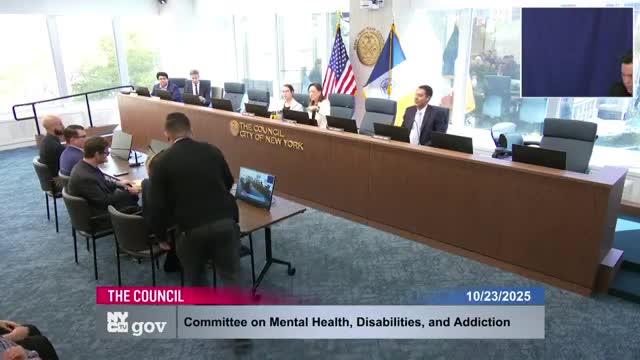Widespread testimony urges City Council to create production accessibility fund for film, TV and theater
Get AI-powered insights, summaries, and transcripts
Subscribe
Summary
Artists, casting directors, producers and disability advocates urged passage of Intro 13‑07, a proposed fund to cover accommodation costs and create production access coordinator positions so disabled artists can be hired and retained; witnesses described practical barriers, cost examples and data showing modest budget impacts.
Dozens of disabled artists, casting professionals, producers and nonprofit advocates testified in support of proposed City Council legislation known as Intro 13‑07, a film, television and theater accessibility fund designed to help productions pay for accommodations, production access coordinators and related hiring costs.
Speakers said the fund would remove an economic obstacle producers cite when they decline to hire disabled actors and crew — not because of talent but because they fear additional costs. "Access is not an upgrade. It is infrastructure," said actor James Caverly. "When access isn't built in, the cost is paid by us, disabled artists."
Why it matters: Witnesses argued that the accessibility fund would make hiring disabled performers and crew more feasible for productions of all sizes, strengthen New York's creative economy and increase authentic representation on stage and screen.
Witnesses and examples: Testimony included performers who worked on high‑profile productions and industry professionals who described concrete, recurring costs. Rosalie Joseph — a longtime casting director who read a written statement from actor Woody Harrelson about the film Champions — said productions face additional line‑items for access coordinators and accommodations that many budgets do not plan for.
Several speakers gave examples of retrofit expenses for accessible dressing rooms and stage lifts. Actor Greg Mozgala said a production had to retrofit a dressing room on stage at a cost reported to him as roughly $60,000; another example cited a roughly $125,000 stage‑lift installation to allow a wheelchair user to enter on Broadway. Testimony stressed that these are one‑time or capital costs that many producers have not budgeted for and that smaller productions often cannot absorb such expenses.
Data and industry context: Richie Siegel of the Inevitable Foundation, which studied accommodation costs, told the committee that accommodations "typically increase budgets by only single‑digit percentages," and that lower‑paid disabled professionals were least likely to request or receive accommodations. Other testimony noted broader representation statistics: witnesses cited studies showing disabled people make up roughly 28% of the U.S. population but account for well under 1% of behind‑the‑camera entertainment workers and only a small fraction of speaking roles on screen.
Program design and funding: Supporters proposed a grants program that would reimburse productions that hire disabled actors, crew or creative professionals and that would fund production access coordinators. Several participants urged that the fund also build a knowledge base of best practices and data so accessible hiring becomes routine rather than ad hoc. Alice Shepherd of Kinetic Light and others said a modest city fund would catalyze larger changes in hiring practices and that the city should pair the fund with outreach to unions, studios and private partners.
Budget context: In the hearing, a council member noted an initial annual fund proposal of $430,000 as a starting point for city grants; witnesses and council members discussed that while the amount is small relative to the city budget, it can seed a program and be expanded over time. Witnesses urged using the fund both for recurring accommodation costs and to offset uneven capital expenses so that productions can plan access from day one.
Unions, production companies and next steps: Testimony included union representatives and casting professionals who said authentic hiring requires a combination of accessible budgets, production‑level access coordinators and training. Witnesses asked the council to design the fund with input from disabled artists, unions and producers and to track outcomes so the program can be scaled.
Ending: Committee members thanked witnesses and said staff would review written testimony submitted after the hearing. Advocates asked the council to create the fund so productions can hire disabled talent and crew without the added barrier of out‑of‑pocket access costs.
